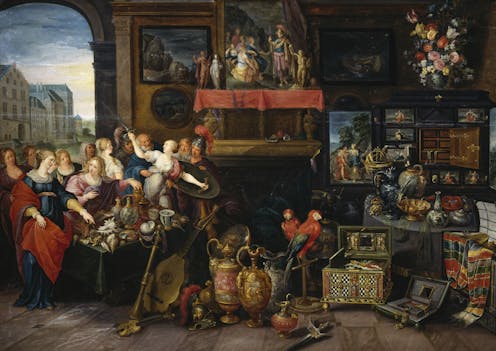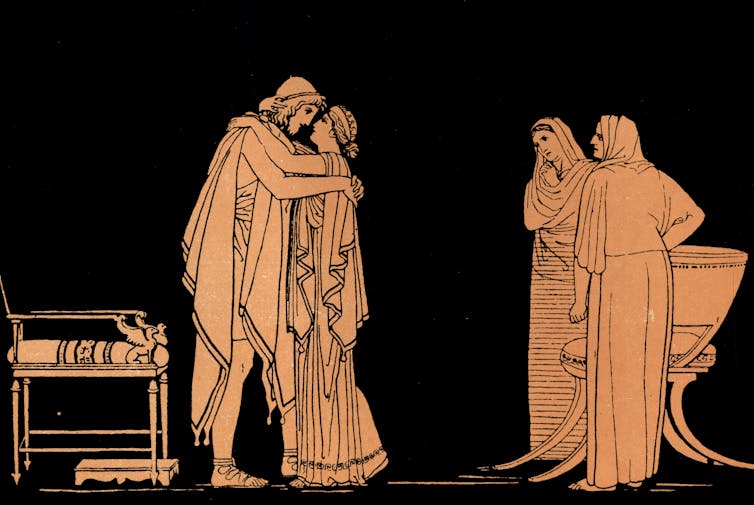
Celebrations are a joyous time of reuniting with family and friends. But afterward, people can sometimes be left uneasily mulling over their relationships. Annual returns home can induce an uncomfortable nostalgia in the tension between how the past is remembered and how the present is experienced.
As someone who studies ancient Greek myth and poetry, I often find myself making sense of my own life through my work. Even though many Greek myths are infamous for disturbing topics such as infanticide and incest, ancient audiences did look to their stories to make sense of themselves and their world.
The bittersweetness of family relationships and reunions turns out to be an important theme.
Heroes and families
What most people may remember from Greek myth are heroes like Hercules or Theseus, who make the world safe for other human beings by killing threatening monsters or punishing criminal humans. Hercules’ killing of the hydra, a dragon with regrowable heads, as one of his labors represent the forces of civilization conquering nature. At a fundamental level, these kinds of stories center on how heroes are capable of making life safer for human communities.
But most heroic narratives also emphasize how individual heroes are a poor fit for family life and may even come to threaten their communities. For example, one reason Hercules had to complete his many labors as a punishment was because he killed his first wife and their children due to a fit of madness sent by the gods.
One of the most famous Greek heroes, Achilles, underscores the antisocial aspect of heroes well in Homer’s “Iliad.” At the beginning of the epic, he actually prays for his people to suffer and die because they didn’t preserve the honor he believed he had earned. Indeed, audiences often overlook that it is Achilles’ own desire to be honored that causes his people to suffer and the death of his companion Patroclus.
The most popular image of heroes is of a savior figure. But their stories also include details about isolation, alienation and the destruction of families, leaving little in the way of hope for relationships.
How we know who we are
Heroic failure in personal relationships helps to emphasize their alienation from their communities. Instead of being distractions, however, I think these personal challenges are part of the point of mythical narratives for audiences who don’t live in fantasy worlds. Learning how to live a normal life is an important theme of the Homeric “Odyssey,” as it describes a 20-year-long journey of the famous hero of Homer’s “Iliad,” Odysseus, on his way home from the Trojan War to be reunited with his family.
This particular narrative from ancient Greece is an exploration of “nostos,” a word that means “homecoming” but has come to mean “sweet” in modern Greek. In the “Odyssey,” Odysseus’ reunion with his family is part of the difficulty of his homecoming.
Central to this difficulty is the question of who the hero is after 20 years at war. As psychiatrist Jonathan Shay argues in his 2002 book, “Odysseus in America,” Odysseus’ travels function as a metaphor for the challenge of reintegrating veterans as they return home.
Just as today, the return home is far more than a simple journey to an old place. For Odysseus, it was a return to the relationships that defined him before he left for Troy.
At its core, the “Odyssey” emphasizes that warriors come from communities and are defined by their families. As I explore in my recent book “The Many Minded Man: The Odyssey, Psychology, and the Therapy of Epic,” the Homeric epic is deeply interested in where our identities come from: memories, the stories we tell about them and the relationships that rely on both memory and story.
Acknowledging the past is crucial for Odysseus – and his audiences – because familiarity is necessary for recreating relationships as a bridge from our past to present selves.
A sequence of reunions occupies the epic’s second half. Odysseus meets his son, a mother figure – an enslaved nurse named Eurycleia – his wife Penelope and his father, Laertes. In each case he lies to them about his identity and has his identity confirmed by an external “sign.”

The signs are linked to stories from the past: Eurycleia recognizes the scar on Odysseus’ leg from a boar hunt when he was a child; Penelope uses the bed he built for them to test his identity; and his father doubts who he is until the two of them tour the orchard they tended together when he was young and Odysseus describes to him the varieties of trees and recounts who planted them.
These details often surprise modern readers who wonder why the “Odyssey” spends so much time on small encounters. Each reunion emphasizes that Odysseus is not truly home until he has reconciled who he is now with who he was before. He must also undergo a similar, more violent reckoning with the people he used to rule.
The cumulative effect of this sequence of reunions is to emphasize that individual identity is created and confirmed by other people. Outside of his home, Odysseus was a warrior; he cannot truly return until he remembers how to be a king, a father, a husband and a son.
Individualism vs. the hero
Odysseus’ famous homecoming – his nostos – provides part of the root of our modern word nostalgia, coined in 1688 to describe a kind of mad longing for the past. Literally meaning “grief for/from a homecoming,” nostalgia describes well that bittersweet feeling of coming to familiar places and memories, but feeling the distance and the passage of time.
Modern research is split over whether nostalgia is good for us. For some, yearning for the past can create anxiety and distress; for others, it can be a resource to create a stronger sense of self.
I believe the “Odyssey” acknowledges that nostalgia works both ways: It helps us remember who we were and drives us to navigate that uncomfortable space between our memories and our identities. The “Odyssey” works against the individualism of the basic heroic myth to help audiences think about how other people matter to us and how the stories we tell each other confirm and create who we are.
Joel Christensen does not work for, consult, own shares in or receive funding from any company or organization that would benefit from this article, and has disclosed no relevant affiliations beyond their academic appointment.
This article was originally published on The Conversation. Read the original article.







